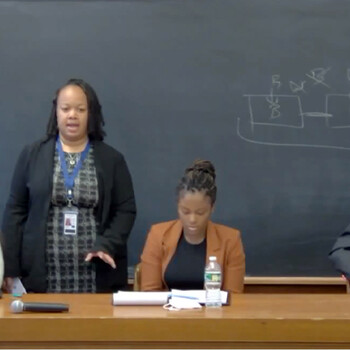Panel Highlights Community Safety as a Public Health Issue

The Quinnipiac-Yale Dispute Resolution Workshop4 brought together three experts at Yale Law School on Oct. 19 for the panel “Decentering Police in Public Safety: Violence Intervention in New Haven and Beyond.” Panelists were Dr. Jeffrey A. Butts, Director of the Research and Evaluation Center at John Jay College of Criminal Justice; Alivia Langley, Program Manager of the Connecticut Violence Intervention Program (CTVIP); and Kayla Vinson, Executive Director of the Law and Racial Justice Center at Yale Law School.
WATCH: “Decentering Police in Public Safety5” Panel
Langley, who was born and raised in the New Haven area, compared violence to an epidemic. She explained that her program seeks to cure violence by detecting and interrupting potential conflicts, identifying and treating the youth who are at the highest risk, and changing community and social norms. Many of the program’s clients are struggling with basic needs, such as untreated trauma, she said.
Butts reinforced the importance of intervening at the community level and resetting social norms.

“Who believes sincerely that community violence arises because of the unique characteristics of a set of individuals?” he asked, pointing to economic inequities, public health, quality of education, and other stressors that contribute to community violence.
Vinson emphasized the need to move away from policing and punishment to address the root causes of violence.
“Our prevailing approach to the violence we do criminalize is responding to harm in ways that are creating more harm,” she said, adding that conditions of incarceration threaten the physical and mental health of those who are incarcerated and their families.
Throughout the discussion, the panelists debunked the myth that violence is caused by individual evil. Rather, they showed that violence is rooted in structural conditions, such as employment and housing. Taking a public health approach, they agreed, would help to address the basic issues prompting violent responses.
“It’s about having a wide range of tools and resources at our disposal that can be deployed to interrupt and prevent harm, not just to respond after it happens,” Vinson said.
The Quinnipiac-Yale Dispute Resolution Workshop sponsors a lecture series featuring nationally recognized scholars and practitioners. Co-directed by Jennifer Taylor ’10, Director of the Arthur Liman Center for Public Interest Law6 at Yale Law School, and Charles Pillsbury, Co-Director of the Center on Dispute Resolution at Quinnipiac Law, the series is open to the public and to the Yale and Quinnipiac communities.


